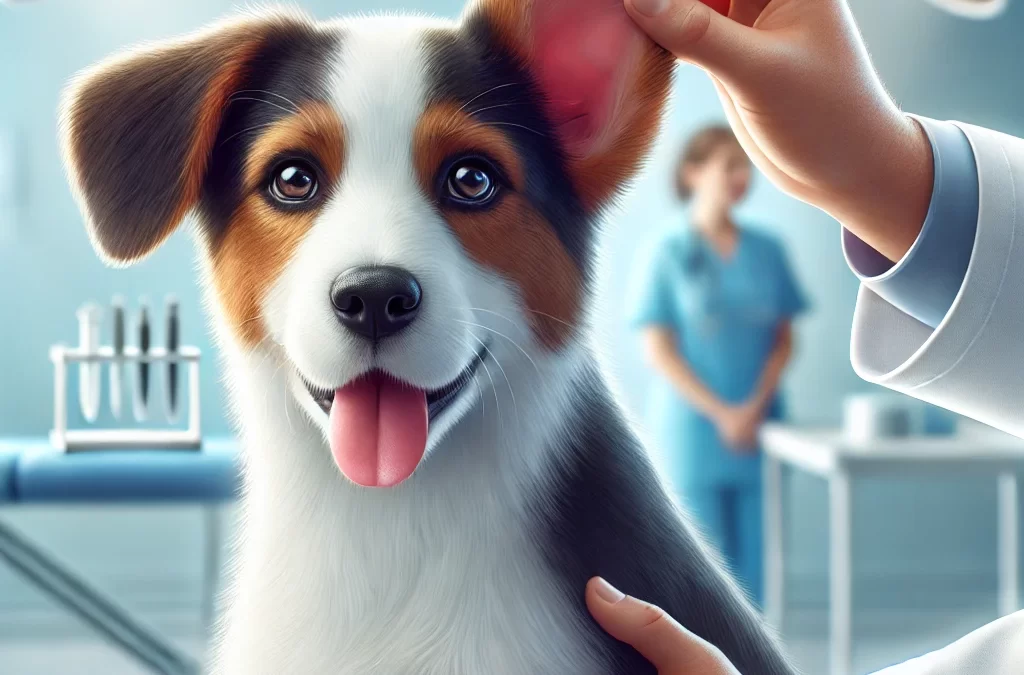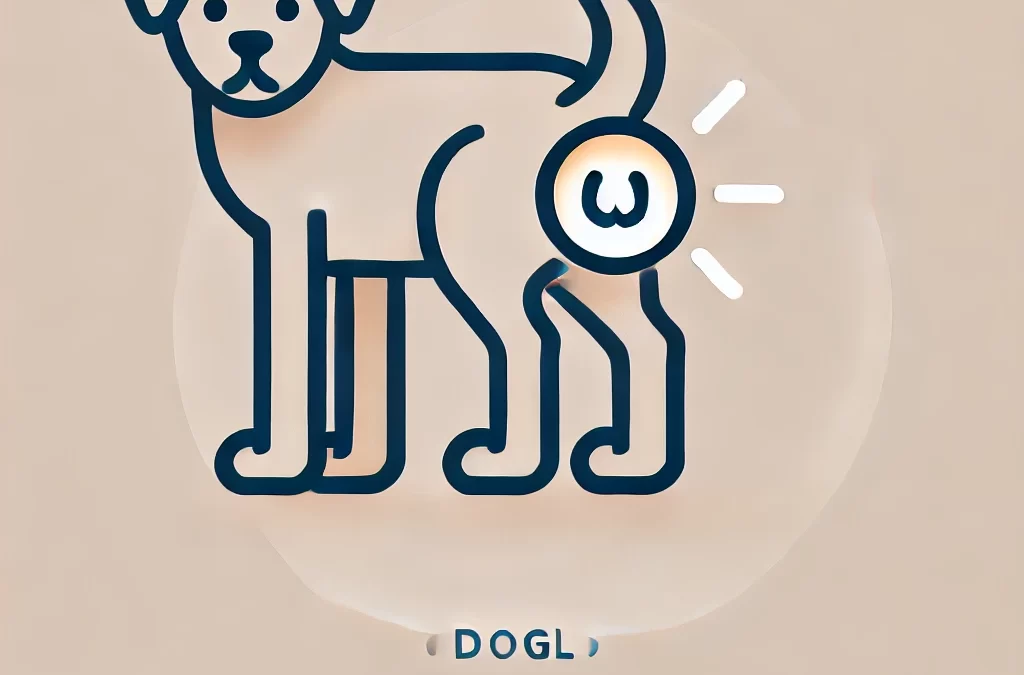
執筆者 TCMVET | 2024年12月14日 | 犬の癌と腫瘍
犬の下腸に異常な腫瘍がみられることは、他の健康問題ほど一般的ではありませんが、気付かれずに見過ごされがちな懸念すべき現象です。良性のポリープから悪性の腫瘍まで、さまざまな腫瘍が犬の消化、全体的な快適さ、長期的な健康に影響を及ぼします。原因、兆候、治療の選択肢を理解することは、愛犬の生活の質を高めるために不可欠です。
下部腸管の異常増殖とは何ですか?
「異常な増殖」という用語は、結腸、直腸、肛門を含む下部消化管に影響を及ぼすさまざまな状態を包含します。これらの増殖には次のようなものがあります。
- ポリープ: 不快感を引き起こす可能性はありますが、広がることはほとんどありません。良性の非癌性腫瘍です。
- 腺癌: 腺細胞から発生する悪性腫瘍で、攻撃性や侵襲性が高いことが多い。
- 平滑筋肉腫: 腸の平滑筋層に影響を及ぼすまれな悪性腫瘍。
- リンパ腫: 腸内のリンパ組織に影響を及ぼす癌で、胃腸疾患にかかりやすい犬によく見られます。
犬の下部腸の腫瘍の原因
正確な原因はさまざまですが、異常な成長の発生にはいくつかの要因が関係しています。
- Age: 高齢犬は細胞の老化と変異により腸腫瘍になりやすくなります。
- 犬種的素因: ジャーマンシェパードやコリーのような犬種は、胃腸がんのリスクが高くなります。
- 食事と環境: 質の悪い食事、毒素への曝露、または慢性的な腸の炎症は、異常な細胞の増殖につながる可能性があります。
- 慢性炎症: 炎症性腸疾患(IBD)などの病気は、異常な増殖の温床となります。
注意すべき兆候と症状
下部腸の異常な増殖は、微妙またはあいまいな症状を示すことが多く、早期発見が困難です。主な兆候は次のとおりです。
- 慢性下痢: 粘液や血液を伴うことが多い、持続的な軟便。
- 便秘またはいきみ: 腫瘍による閉塞により排便が困難になる。
- 血便(血便): 鮮やかな赤色または黒っぽいタール状の血が一般的な兆候です。
- 腹痛: 犬は、泣き声を上げたり、落ち着きがなかったり、背中を丸めたりするなどの兆候を示すことがあります。
- Weight Loss: Unexplained weight loss despite a normal appetite.
- Lethargy and Weakness: 貧血または成長の全身的影響によるエネルギーレベルの低下。
診断:隠れた問題を明らかにする
下部腸管の腫瘍の診断には、臨床検査と高度な診断法の組み合わせが必要です。
- 身体検査: 直腸検査では、下部消化管に触知可能な腫瘍が見つかることがあります。
- イメージング: X 線、超音波、または CT スキャンは、腫瘍とその位置を視覚化するのに役立ちます。
- 内視鏡検査: 結腸に挿入されたカメラにより、異常な組織を特定し、場合によっては生検を行うことができます。
- 生検: 組織サンプルにより腫瘍が良性か悪性かが確認され、治療の指針となります。
治療オプション: それぞれのケースに合わせたカスタマイズ
治療法は、腫瘍の種類、場所、段階によって異なります。
- 外科的除去: 局所的な腫瘍、特に良性のポリープや小さな悪性腫瘍に対する第一選択の治療法。
- 化学療法: 転移した癌や手術で完全に除去できない癌に推奨されます。
- 放射線療法: 悪性腫瘍に対する手術と併用されます。
- 緩和ケア: 進行した、または治療不可能なケースにおける痛みの管理と犬の快適さの向上に重点を置いています。
消化器系の健康を総合的にサポート
医療による治療は主な症状に対処しますが、総合的なアプローチは追加のサポートを提供できます。
- 高繊維食: 消化をスムーズにし、下部腸の炎症を軽減します。
- プロバイオティクス: 腸内細菌叢を強化し、腸全体の健康をサポートします。
- ウコン(クルクミン): 抗炎症作用と潜在的な抗癌作用があることで知られています。
- CBDオイル: 炎症や痛みを軽減し、犬の生活の質を向上させます。
予防策:リスクの軽減
すべての腫瘍を予防できるわけではありませんが、犬のリスクを軽減するために実行できる手順があります。
- 定期検診: 毎年の獣医検査は異常を早期に発見するのに役立ちます。
- 高品質の食事: 胃腸のストレスを最小限に抑えるために、バランスのとれた栄養価の高い食事を与えてください。
- 便の健康状態を監視する: 犬の便や排便習慣の変化に注意してください。
- 毒素への曝露を制限する: 低品質の食品を与えたり、犬を有害な化学物質にさらしたりしないでください。
ペットの飼い主の精神的負担
腸に腫瘍のある犬の世話は、精神的に疲れることがあります。不安になったり、圧倒されたりするのは当然ですが、あなたは一人ではないことを忘れないでください。サポート グループや獣医の専門家など、多くのリソースが、この旅を通してあなたを導いてくれます。
結論: 知識は力である
犬の下腸に異常がみられると、不安に感じるかもしれませんが、早期発見と積極的なケアにより、多くの犬が充実した生活を送ることができます。常に注意を払い、定期的に獣医のアドバイスを受け、あなたの愛犬にできる限り最善のケアを提供してください。

執筆者 TCMVET | 2024年12月14日 | 犬の癌と腫瘍
犬の耳に腫れがある場合、飼い主を驚かせる可能性の一つは、 組織球腫これらの良性腫瘍は若い犬によく見られ、急速に進行し、目立つ場所に発生するため、心配に思われるかもしれません。しかし、通常は無害で、自然に治る場合が多いです。組織球腫の特徴と、愛犬に最善のケアを施す方法について詳しく説明します。
組織球腫とは何ですか?
組織球腫は、 ランゲルハンス細胞は、皮膚に存在する免疫細胞の一種です。この腫瘍は、3歳未満の犬に最も多く見られ、通常は頭部、耳、または四肢に発生します。
耳の場合、組織球腫は外面または縁に形成されることが多く、ペットの飼い主を心配させる目に見えるしこりを形成します。その劇的な外観にもかかわらず、組織球腫は犬の腫瘍の中で最も良性の形態の 1 つと考えられています。
犬に組織球腫が発生するのはなぜですか?
組織球腫の正確な原因は不明ですが、若い犬の過剰な免疫反応に関連していると考えられています。ボクサー、ラブラドール、ブルドッグなどの犬種は、どの犬種でも発症する可能性がありますが、発症しやすい傾向があります。
耳の組織球腫の見分け方
組織球腫は、その外観と行動が特徴的であるため、比較的簡単に見分けることができます。
- 外観: 隆起した丸い赤い塊で、多くの場合は毛がなく滑らかです。耳の場合は、皮膚が薄く毛がないため、特に目立つことがあります。
- サイズ: 通常は小さく、直径は約 0.5 ~ 2 cm です。
- テクスチャ: 触ると硬く、表面はわずかに潰瘍状または光沢がある。
- 行動: 悪性腫瘍とは異なり、組織球腫は傷が付いたり感染したりしない限り、通常は不快感を引き起こしません。
心配すべきでしょうか?
組織球腫の最も安心できる点の一つは、 自己制限的なつまり、多くの場合、2~3 か月以内に介入なしで消えます。ただし、診断を確認し、次のようなより深刻な状態を除外するには、獣医の診察が不可欠です。
診断中に何が起こるか
獣医師は通常、組織球腫を特定するために以下の方法を使用します。
- 身体検査: 犬の腫瘍と全体的な健康状態の詳細な検査。
- 穿刺吸引法(FNA): 顕微鏡分析のために少量の細胞サンプルを抽出します。
- 生検: まれに、さらなる確認のために生検が行われることがあります。
治療とケアの選択肢
ほとんどの組織球腫は自然に治りますが、特定のケースでは介入が必要になる場合があります。
- 治療の必要はありません: しこりが犬を悩ませていない場合は、自然に治まるまで放置してもかまいません。
- 外科的除去: まれに、腫瘍が炎症を引き起こしたり、治癒が遅い場合には、獣医師が除去を勧める場合があります。
- Topical Treatments: 組織球腫が潰瘍化した場合は、抗生物質のクリームやスプレーで感染を防ぐことができます。
ホームケアのヒント
組織球腫が治まるまで待つ間、愛犬が快適に過ごせるようにするために実行できる手順がいくつかあります。
- 傷防止: 犬が耳をひどく掻く場合は、出血や感染症を引き起こす可能性があるため、エリザベスカラーを使用してください。
- 成長を監視する: しこりの大きさ、色、質感に注意してください。急激な変化があった場合は、再度の診察が必要になる場合があります。
- エリアを清掃する: 二次感染のリスクを減らすために、獣医が推奨する溶液で耳を優しく洗浄してください。
耳の組織球腫とはどう違うのでしょうか?
耳の組織球腫は、耳が敏感な場所にあるため、目立ちやすい場合があります。耳が非対称または垂れ下がっているように見え、犬が頻繁に頭を振ることがあります。これらの特定の兆候により、監視とケアがさらに重要になります。
愛犬の治癒をサポートする自然なアプローチ
ペットの飼い主の中には、伝統的な獣医治療を補うために自然療法を検討している人もいます。これらの方法は治療法ではありませんが、皮膚の健康全般をサポートすることができます。
- オメガ3脂肪酸: 健康的な免疫反応を促進し、炎症を軽減します。
- カレンデュラクリーム: しこりの周りの炎症を和らげる鎮静作用のあるハーブ療法。
- CBDオイル: 不快感に関連する掻きむしりやストレスを軽減するのに役立ちます。
獣医に相談すべきとき
組織球腫は良性ですが、次のような症状が見られたら獣医に相談してください。
- しこりが急速に大きくなったり、質感が変化したりします。
- 持続的な掻き傷、出血、または分泌物。
- 組織球腫は3か月経っても退縮しません。
最終的な考え
犬の耳に組織球腫があると、一見心配になるかもしれませんが、通常はほとんど介入せずに治る無害な症状です。その独特な性質を理解し、注意深くケアすることで、犬が治療中ずっと幸せで健康な状態を保つことができます。

執筆者 TCMVET | 2024年12月13日 | 犬の癌と腫瘍
犬の鼻がんは鼻がんとも呼ばれ、比較的まれですが、鼻腔または副鼻腔に影響を与える悪性の病気です。犬のがん全体の 1% 未満を占めるに過ぎませんが、その重症度は侵襲性があり、早期発見が難しいことにあります。この記事では、鼻がんと闘う犬の症状、診断、治療オプション、サポートケアについて詳しく説明します。
犬の鼻がんとは何ですか?
犬の鼻がんは主に鼻腔または副鼻腔内に発生する腫瘍です。最も一般的なタイプは 腺癌ただし、扁平上皮癌、線維肉腫、骨肉腫などの他の形態が発生することもあります。この病気は、通常、高齢の犬に発生し、大型犬ではリスクが若干高いようです。
兆候と症状
鼻がんの初期症状はわかりにくく、呼吸器感染症やアレルギーと間違われることがよくあります。病気が進行するにつれて、症状はより顕著になります。次の点に注意してください。
- 持続的な鼻水
片側の鼻水(片方の鼻孔に影響)が血性または粘液性であることが特徴的な症状です。
- 頻繁なくしゃみ
治療しても改善しない慢性のくしゃみは、腫瘍による鼻の炎症を示している可能性があります。
- 顔の腫れ
腫瘍が周囲の組織に侵入すると、鼻、目、額の周囲に腫れが生じることがあります。
- 呼吸困難
いびきや大きな呼吸音は、鼻腔の閉塞を示している可能性があります。
- 鼻血(鼻出血)
断続的または持続的な鼻からの出血がしばしば報告されます。
- 神経症状
腫瘍が脳に広がると、発作、見当識障害、行動の変化などの症状が現れることがあります。
- 食欲不振と体重減少
多くの癌と同様に、全身的な影響により食物摂取量の減少や体重減少が起こる可能性があります。
診断
鼻がんの診断には、次のような徹底的な評価が必要です。
- 身体検査獣医師は顔の非対称性や呼吸時の異常な音がないか確認することがあります。
- 鼻鏡検査鼻腔に挿入された小型カメラにより腫瘍を視覚化できます。
- イメージングX 線、CT スキャン、または MRI により、腫瘍とその広がりの詳細な画像が得られます。
- 生検組織サンプルによりがんの種類と重症度を確認します。
治療の選択肢
治療法は、腫瘍の大きさ、種類、進行度、および犬の全体的な健康状態によって異なります。選択肢には次のものがあります。
- 放射線治療
放射線治療は、腫瘍を縮小し、症状を緩和することを目的としており、鼻がんに対する最も効果的な治療法です。がんを治癒することはできませんが、生活の質を大幅に改善することができます。
- 手術
鼻領域の複雑な構造のため、腫瘍の外科的切除は困難ですが、特定のケースでは試みられることがあります。
- 化学療法
化学療法はあまり一般的に使用されていませんが、特定の腫瘍の種類に対して、または他の治療法の補助として推奨される場合があります。
- 緩和ケア
治癒的治療が選択肢にない場合、緩和ケアは抗炎症薬、鎮痛剤、鼻づまり除去薬などの薬物による痛みや不快感の緩和に重点を置きます。
支持療法のための自然療法
従来の治療法に加えてホリスティックなアプローチを取り入れることで、犬の快適性を高めることができます。
- ハーブサプリメント
ハーブ類 ターメリック (クルクミン)と レンゲ 抗炎症作用と免疫力を高める作用があると考えられています。
- 食事の調整
高品質で低炭水化物の食事は、全体的な健康をサポートし、炎症を軽減します。
- CBDオイル
カンナビジオールは、進行癌を患った犬の痛みを管理し、不安を軽減するのに役立つ可能性があります。
予後と生活の質
犬の鼻がんの予後は、腫瘍の種類や診断時のステージなどの要因によって異なります。放射線療法により、多くの犬で症状が緩和し、生存期間が延長します。生存期間は 8 ~ 18 か月に及ぶ場合が多いです。治療を行わない場合、病気は急速に進行し、数週間から数か月以内に進行することがよくあります。
愛犬をサポートする方法
- 症状を監視する: 呼吸、食事、エネルギーレベルの変化を追跡します。
- 頻繁な獣医の診察: 定期的な検査により、犬の状態を注意深く監視できます。
- 快適さを提供する柔らかい寝具、静かな環境、食べ物や水への容易なアクセスは大きな違いを生みます。
最終的な考え
犬の鼻がんは診断が難しい病気ですが、適切なタイミングで介入し、総合的な治療計画を立てることで、愛犬に可能な限り最高の生活の質を与えることができます。必ず獣医師に相談し、愛犬の特定のニーズに合わせた治療オプションを検討してください。

執筆者 TCMVET | 2024年12月13日 | 犬の癌と腫瘍
犬の腎臓がんはまれではありますが、あなたの愛犬の生活の質に重大な影響を与える深刻な病気です。兆候を早期に認識することで、治療結果に大きな違いが生まれます。この記事では、腎臓がんの明らかな兆候を探り、なぜ気づかれないことが多いのかを説明し、支持療法の選択肢についての洞察を提供します。
犬の腎臓がんとは何ですか?
腎臓がんとは、片方または両方の腎臓における異常な細胞増殖を指します。犬の場合、腎細胞がんは最も一般的なタイプの腎臓がんであり、主に高齢の犬に発症します。その正確な原因は不明ですが、遺伝的素因や毒素への曝露が関与している可能性があります。
微妙な兆候:腎臓がんが目に見えないことが多い理由
腎臓がんの症状は、尿路感染症や一般的な老化などのそれほど深刻ではない問題と間違えられやすいです。症状が重なると、診断が遅れることがよくあります。注意すべき点は次のとおりです。
- 頻尿または排尿困難
排尿頻度の増加や排尿時の明らかな不快感は、腫瘍による腎臓へのストレスまたは閉塞を示している可能性があります。
- 尿に血が混じる(血尿)
鮮やかな赤色または暗褐色の尿は、犬の腎臓に何らかの異常があるかもしれないという重要な警告サインです。
- 食欲減少
突然の食欲不振と体重減少は、腎機能に関連した全身的な問題の兆候である可能性があります。
- 無気力
犬が異常に疲れているように見えたり、日常の活動に参加したがらない場合、腎機能障害による根本的な疲労を示している可能性があります。
- Abdominal Swelling
腹部の腫れは、大きな腎臓腫瘍が他の臓器を圧迫することによって起こる可能性があります。
- 嘔吐と吐き気
腎臓がんが進行するにつれて、血液中に毒素が蓄積し、胃腸障害を引き起こします。
腎臓がんは他の病気とどう違うのか
上記の症状の多くは、腎臓病、膀胱感染症、さらには糖尿病の症状に似ています。しかし、腎臓がんの場合、これらの兆候はより持続的で、治療しないと時間の経過とともに悪化します。
診断の役割
腎臓がんの検出には、次のような複数の検査を組み合わせる必要があります。
- 超音波とX線検査により、潜在的な腫瘍の画像が得られます。
- 血液検査により腎機能の異常または貧血が明らかになります。
- 尿検査では、顕微鏡レベルの血液や癌細胞を特定することができます。
獣医師は、がんの種類と重症度を確認するために生検を勧めることもあります。
支持療法のための自然療法
影響を受けた腎臓を外科的に除去することが主な治療法となることが多いですが、ホリスティックなアプローチは従来の治療法を補完し、犬の生活の質を向上させることができます。
- ハーブ療法
チュアンシオン(四川ラビジン)などのハーブは、血液循環を促進し、腎臓の周りの炎症を軽減するのに役立つ可能性があります。
- 食事の調整
低リン、高品質タンパク質の食事は腎臓機能をサポートし、残った腎臓の負担を軽減します。
- CBDオイル
カンナビジオールは、治療を受けている犬の痛みを管理し、ストレスを軽減するのに役立つ可能性があります。
予防のヒント: リスクを軽減できますか?
腎臓がんを完全に予防することは不可能ですが、腎臓全体の健康を促進するために実行できる手順はあります。
- 新鮮なろ過水を用意してください。
- 農薬などの既知の発がん物質への曝露を避けてください。
- 特に高齢犬の場合は、定期的に獣医による検診を受けるようにしてください。
獣医師の受診時期
上記の症状に気付いた場合は、すぐに獣医師に相談してください。手術、化学療法、緩和ケアなど、早期に介入することで、より良い結果が得られる可能性があります。
最終的な考え
犬の腎臓がんは診断が難しい病気ですが、犬の健康に積極的に取り組むことで大きな違いが生まれます。微妙な変化に気づき、適切なタイミングで医師のアドバイスを求めることで、愛するペットが適切なケアと快適さを受けられるようになります。

執筆者 TCMVET | 2024年12月12日 | 犬の癌と腫瘍
犬の肛門がんは比較的まれですが、早急な治療が必要な深刻な病気です。最も頻繁に診断されるタイプは 肛門嚢腺癌肛門腺から発生する悪性腫瘍です。このタイプの癌は、その攻撃的な性質と体の他の部分に広がる可能性があることで知られています。この記事では、肛門癌に罹患した犬の症状、診断、治療の選択肢、および見通しについて説明します。
犬の肛門がんとは何ですか?
肛門がんは、肛門腺の中または近くに悪性腫瘍が発生することを指します。肛門の両側にあるこれらの腺は、縄張りを示すために使用する液体を分泌する役割を果たします。これらの腺にがんが発生すると、急速に増殖し、近くのリンパ節、肺、または他の臓器に転移することがあります。
犬の肛門がんの症状
犬の肛門がんの症状は、腫瘍の大きさや場所、転移の有無によって異なります。一般的な兆候は次のとおりです。
- しこりや腫れ: 肛門付近の目立つ腫瘤または腫れ。
- 排便困難: 腫瘍が直腸を塞ぐことによる、いきみ、痛み、または便の形状の変化。
- 出血: 肛門の周囲または便に血が混じる。
- すべったり舐めたり: 犬は不快感から地面を這ったり、その部分を過度に舐めたりすることがあります。
- 高カルシウム血症の症状: 血液中のカルシウム濃度の上昇により、喉の渇き、頻尿、無気力、または衰弱が起こります。
- 体重減少と食欲不振: 症状が進行すると、体重減少や食欲減退などの全身症状が現れる場合があります。
肛門がんはどのように診断されるのでしょうか?
肛門がんを診断するために、獣医師は以下の検査を組み合わせて行います。
- 身体検査: 肛門周辺のしこり、腫れ、不快感の有無を確認します。
- 穿刺吸引または生検: 腫瘍組織を採取して悪性度を確認します。
- 血液検査: 高カルシウム血症またはその他の異常を特定する。
- イメージング: X 線、超音波、または CT スキャンにより、がんの範囲を判断し、転移の有無を確認します。
犬の肛門がんの治療法
治療方法はがんの進行度と広がりに応じて異なります。一般的な選択肢は次のとおりです。
- 手術だ: 局所性肛門がんの主な治療法は、腫瘍と影響を受ける可能性のあるリンパ節を外科的に切除することです。
- 放射線療法: 残存癌細胞を標的とする手術と組み合わせて使用されることが多い。
- 化学療法: がんが転移した場合や、他の治療の補助として推奨されます。
- 緩和ケア: 症状が進行した場合は、疼痛管理、食事の調整、支持療法によって生活の質を向上させることができます。
肛門がんを患った犬の予後
肛門がんを患った犬の予後は、腫瘍の大きさ、転移の有無、治療内容など、いくつかの要因によって決まります。早期発見と積極的な治療により生存率が向上し、多くの犬が治療後も長期間にわたり良好な生活の質を維持しています。ただし、転移を伴う進行した症例では予後はあまり良くありません。
肛門がんを患った犬のケア
ペットの飼い主として、愛犬にとって快適でサポート力のある環境を提供することは不可欠です。以下のヒントに従ってください。
- 定期的な獣医の診察: 犬の状態を監視するために、頻繁に健康診断をスケジュールしてください。
- Nutrition: 治療中は犬のニーズに合わせたバランスの取れた食事を与えてください。
- 疼痛管理: 獣医と協力して犬が快適に過ごせるようにしてください。
- 心の支え: 犬が治療のストレスに対処できるように、愛情と安心感を与えてください。
結論
犬の肛門がんは進行が早いですが、早期発見と包括的な治療計画により、結果に大きな違いが生まれます。症状に注意し、異常な兆候に気づいたらすぐに獣医の診察を受けてください。適切なサポートとケアがあれば、困難な時期でも犬は良好な生活の質を維持できます。





